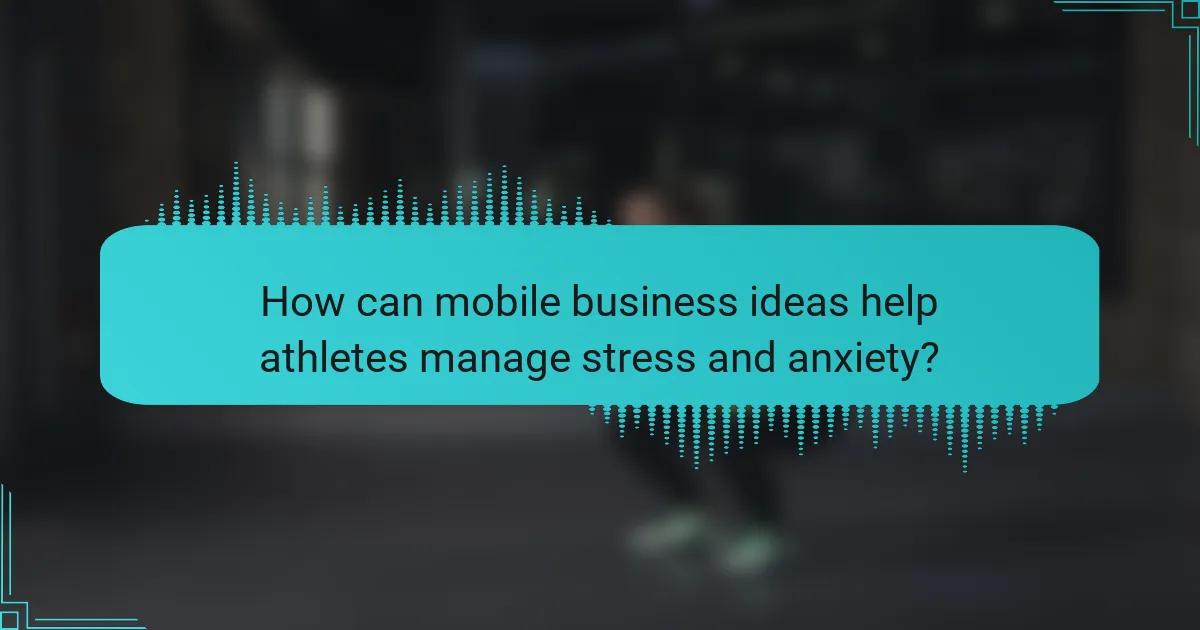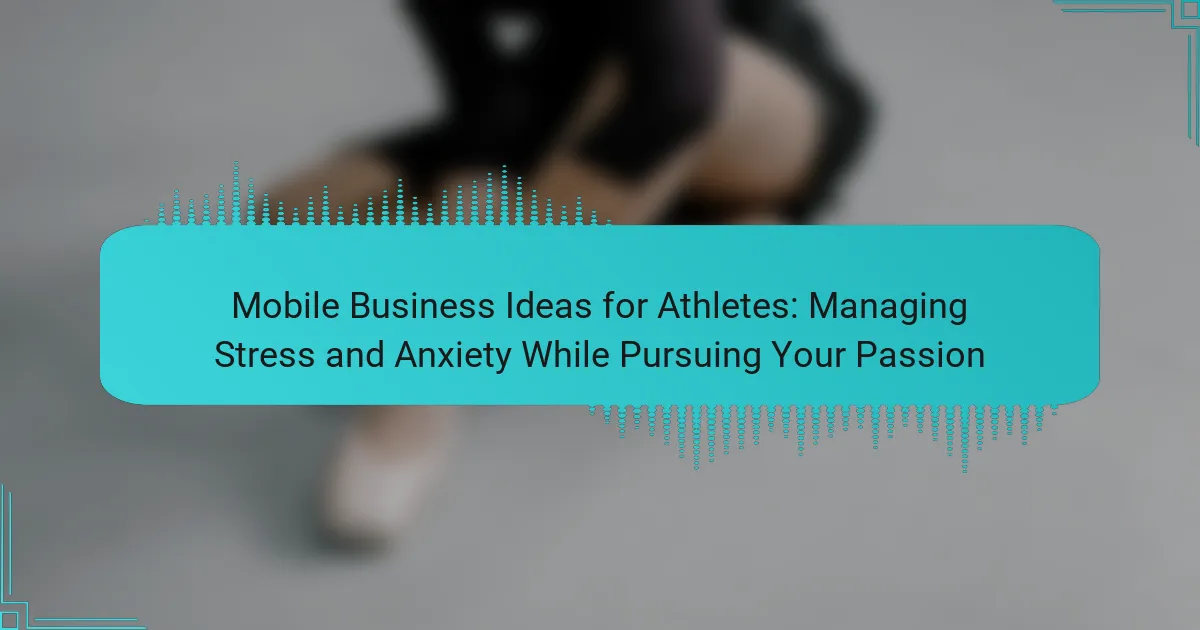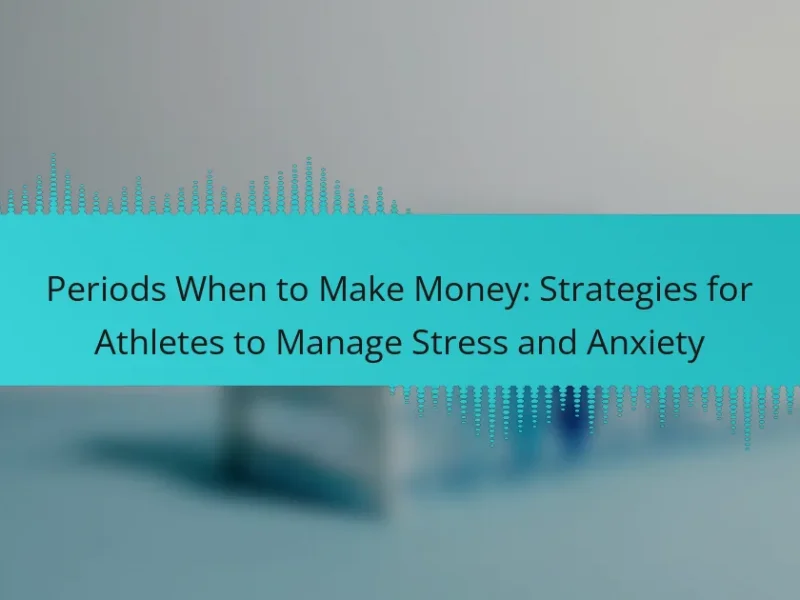Managing stress and anxiety is crucial for athletes pursuing their passion. Mobile business ideas provide tailored solutions like mindfulness apps, virtual coaching, and community support. These tools enhance mental well-being, offering features such as guided meditation and personalized training. Engaging with peers fosters resilience and helps athletes navigate common challenges effectively.

How can mobile business ideas help athletes manage stress and anxiety?
Mobile business ideas can significantly aid athletes in managing stress and anxiety by providing tailored solutions that enhance mental well-being. Innovative apps and platforms can offer mindfulness exercises, personalized training regimens, and community support.
For instance, fitness tracking apps can integrate stress management features, such as guided meditation sessions that athletes can access anytime. These tools foster a sense of control and promote relaxation, which is essential for optimal performance.
Moreover, mobile business models that focus on virtual coaching can connect athletes with mental health professionals. This accessibility helps athletes address stressors proactively, ensuring they maintain a healthy mindset while pursuing their goals.
Lastly, community-driven platforms can encourage athletes to share experiences and coping strategies, building a support network that mitigates feelings of isolation. Engaging with peers can enhance resilience and provide practical solutions to common challenges.
What are the key benefits of mobile businesses for athletes?
Mobile businesses offer athletes flexibility, stress management, and additional income streams. They allow athletes to pursue their passion while maintaining a balanced lifestyle. This adaptability helps reduce anxiety associated with traditional employment. Furthermore, mobile businesses can enhance brand visibility, creating unique opportunities for personal growth and community engagement.
What unique mobile business ideas can athletes explore?
Athletes can explore unique mobile business ideas such as fitness coaching apps, wellness subscription services, virtual training platforms, and sports merchandise e-commerce. These ventures can help manage stress while pursuing their passion. Each idea leverages an athlete’s experience and expertise, creating value for users. For example, fitness coaching apps provide personalized training plans, enhancing user engagement and retention.
How can coaching services be offered through mobile platforms?
Coaching services can be effectively offered through mobile platforms by utilizing apps and online communication tools. These platforms allow athletes to access personalized coaching, stress management techniques, and anxiety relief strategies anytime, anywhere. Mobile applications can provide features such as video calls, chat support, and interactive resources, enhancing the coaching experience. Additionally, integrating tracking tools for progress monitoring can help athletes stay motivated and focused on their goals.
What are the advantages of creating fitness apps tailored for mental wellness?
Creating fitness apps tailored for mental wellness enhances emotional resilience and reduces stress. These apps provide personalized strategies to manage anxiety, integrate mindfulness practices, and promote physical activity, which is vital for mental health. They can track mood changes, offer guided exercises, and foster community support, making them essential tools for athletes balancing passion and mental wellness.
How can athletes monetize their experiences through podcasts or blogs?
Athletes can monetize their experiences through podcasts or blogs by sharing insights, personal stories, and expertise. This creates engagement and builds a loyal audience.
Podcasts allow athletes to connect with listeners through interviews, discussions, and storytelling, enhancing their brand while providing value. Blogs offer a platform for written content, including training tips, mental health strategies, and industry insights, which can attract sponsorships and advertising.
By leveraging their unique experiences, athletes can create authentic content that resonates with fans and fosters community. This approach not only generates income but also promotes mental well-being by providing a creative outlet.
What are the universal strategies for coping with stress and anxiety?
To cope with stress and anxiety, athletes can implement strategies like mindfulness, exercise, and time management. Mindfulness practices, such as meditation, help enhance focus and reduce anxiety. Regular physical activity releases endorphins, improving mood and resilience. Effective time management allows athletes to balance training and personal life, reducing overwhelm. These strategies promote mental well-being while pursuing athletic passions.
What role does time management play in reducing stress?
Time management plays a crucial role in reducing stress by enabling athletes to prioritize tasks and allocate time effectively. Effective time management helps in balancing training, competitions, and personal life, which minimizes feelings of overwhelm. Athletes who manage their time well report lower anxiety levels and improved performance. By setting clear goals and deadlines, they can focus on their passion without the burden of last-minute pressures.
How can physical training routines be adjusted to support mental health?
Adjusting physical training routines can significantly enhance mental health by incorporating mindfulness, flexibility, and recovery strategies. Mindfulness practices during workouts promote focus and reduce anxiety. Flexibility in training schedules allows athletes to prioritize mental well-being and avoid burnout. Recovery strategies, such as rest days and active recovery, help manage stress levels effectively. These adjustments create a balanced approach, supporting both physical and mental health in athletes pursuing their passions.
What unique tools and resources are available for athletes in mobile business?
Athletes have access to various unique tools and resources in mobile business that help manage stress and anxiety. Mobile applications designed for mental health offer guided meditations and stress-relief techniques. Wearable technology tracks physical activity and stress levels, providing real-time feedback. Online platforms connect athletes with mental health professionals for personalized support. Virtual communities foster peer connections, allowing athletes to share experiences and coping strategies. These resources empower athletes to maintain mental well-being while pursuing their passions.
How can technology enhance mental health support for athletes?
Technology can significantly enhance mental health support for athletes by providing accessible resources and personalized tools. Mobile applications offer features like mood tracking, guided meditation, and stress management techniques tailored to athletes’ unique pressures. These tools facilitate real-time support, enabling athletes to manage stress and anxiety effectively while pursuing their passions. For instance, wearable devices can monitor physiological responses to stress, providing valuable data to inform mental health strategies. As a result, athletes can develop resilience and maintain peak performance through proactive mental health care.
What innovative apps specifically target athlete mental wellness?
Several innovative apps focus on athlete mental wellness, including Headspace, Calm, and Mindfulness Coach. These applications provide guided meditation, stress management techniques, and mental resilience training. For example, Headspace offers specific programs tailored for athletes to enhance focus and reduce anxiety. Calm features sleep stories and breathing exercises that can help athletes unwind after intense training sessions. Mindfulness Coach provides tools for developing mindfulness skills, which are crucial for maintaining peak performance under pressure. These apps empower athletes to manage stress effectively while pursuing their passions.
What rare strategies can athletes implement for stress management?
Athletes can implement rare strategies like biofeedback, mindfulness-based stress reduction, and nature immersion for effective stress management. Biofeedback trains athletes to control physiological functions, enhancing their mental resilience. Mindfulness techniques improve focus and reduce anxiety during competitions. Nature immersion fosters relaxation and mental clarity, promoting overall well-being.
How can athletes create community support networks through mobile platforms?
Athletes can create community support networks through mobile platforms by utilizing social media, messaging apps, and dedicated fitness communities. These tools foster connections, share experiences, and provide emotional support. Mobile applications enable athletes to collaborate on training, share tips, and encourage one another, enhancing mental resilience. Engaging in these platforms helps reduce stress and anxiety, promoting a sense of belonging.
What are the benefits of personalized mental health coaching for athletes?
Personalized mental health coaching for athletes enhances performance, resilience, and overall well-being. It offers tailored strategies to manage stress and anxiety effectively. Coaches help athletes develop mental skills, improve focus, and enhance emotional regulation. Research indicates that athletes who engage in personalized coaching experience reduced anxiety levels and improved performance consistency. Additionally, this coaching fosters a supportive environment that promotes self-awareness and personal growth, contributing to long-term mental health benefits.
What best practices can athletes follow to optimize their mobile business?
Athletes can optimize their mobile business by focusing on effective time management, leveraging social media for brand building, and maintaining mental well-being. Prioritize tasks and set clear goals to reduce stress. Utilize platforms like Instagram and TikTok to engage with fans, showcasing personal stories and training routines. Regular mindfulness practices can help manage anxiety, ensuring athletes remain focused on their passion while growing their business.
What common mistakes should athletes avoid when starting a mobile business?
Athletes should avoid common mistakes like neglecting market research, underestimating startup costs, and failing to build a support network. Proper planning and understanding of the mobile business landscape are essential for success. Many athletes overlook the importance of balancing their time between training and business activities, leading to burnout. Establishing clear goals and maintaining effective time management can mitigate stress and anxiety while pursuing a mobile business.
How can athletes leverage their experiences to inspire others while managing stress?
Athletes can inspire others by sharing their experiences and coping strategies for stress management. By discussing personal challenges, they foster relatability and encourage resilience.
Engaging in storytelling allows athletes to connect emotionally, demonstrating how they navigate pressures. This approach not only motivates others but also reinforces their own coping mechanisms.
Additionally, athletes can leverage social media platforms to reach wider audiences, sharing tips on mindfulness practices and stress-relief techniques. This unique attribute of using digital platforms enhances their influence and fosters community support.
Finally, participating in workshops or speaking engagements provides a rare opportunity for athletes to mentor others, creating a positive feedback loop of inspiration and stress management.


